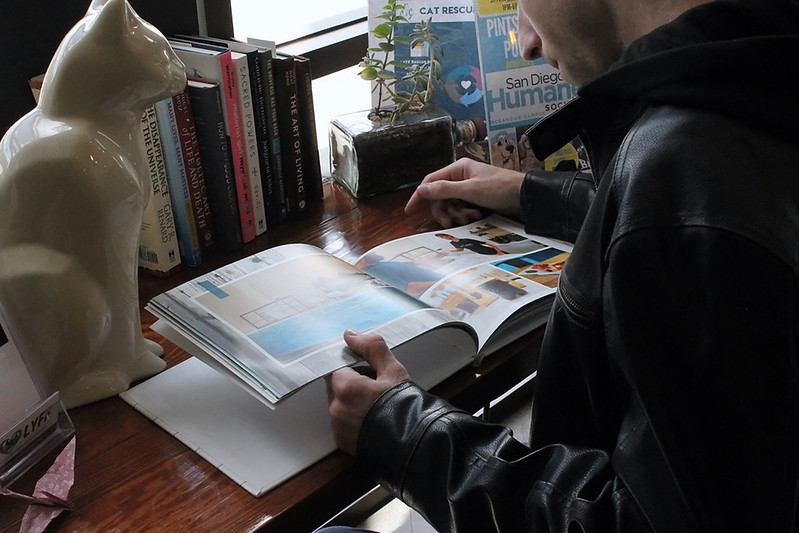In many ways language carries the ability to satisfy multiple human needs. From succeeding in our need for a career to improving our conversations to fathoming the depths of our human condition, language use and its mastery broadens our mind and broadens our world.
To serve these needs and more, the language we learn through meditatively reading in literature, philosophy, and journalism is the best of all—in pragmatic, interpersonal, rational, creative, and contemplative ways.
Knowing the nuances and connotations of language helps us pragmatically by assisting us to write well. With an adept use of language, we can write to advocate for causes we believe in, which can in turn help us to find a niche in which to devote ourselves to a personal career.
And what could be better than expressing ourselves in a career that we love? Becoming educated in the use of language supplies us with the verbal resources that proliferate these personal possibilities for self-empowerment.
Language can help us interpersonally as well. During COVID, many came to know—or to know even more keenly—what it feels like to be isolated and alienated.
The distance between us has already been accentuated by the susceptibility to self-engrossment to which the modern-day societal focus on specialization has positioned us.
When COVID hit, what little human connection there was seemed to have vanished. But through a self-investment in language, we can cultivate a garden of the mind that will grow resources for the re-emergence of interpersonal connection.
There is a certain magic when two people connect in a conversation over a spoken word that they each have contemplated in private. It is magical to witness the beauty of the experience when each conversant sees the other has shared that same rapturous delight in beholding the meaning of this word in their own separate personal experience of solitude. It is an inebriating interpersonal rapport.
Language can also help us with a rational understanding of the world. When we learn a new word, we can see the world in a new way. Every time we discover the meaning of a word that we learn, we become acquainted with a new dimension of reality.
Regular rumination in pondering the imponderables within a rational understanding of reality fructifies in the development of an intuitive perspicacity, of which we become conscious when we see how readily we become capable of apprehending—and utilizing—newly acquired concepts.
Our critical faculty also develops as a result of an augmented rational perspective, and we find that we can detect linguistic subterfuge, such as when others dissemble, obfuscate, equivocate, or use other such means of misrepresentation with nefarious intrigue. This is one of the avowed purposes of higher education—to develop one’s critical faculty to protect oneself.
But there is another aspect of language learning as relates to rationality, and that is to where it can lead. With a comprehensive rational understanding of a full panoply of literary, philosophical, and journalistic language, meaningful creativity fathers-forth.
The passion for language showers itself when we notice how all of the words in our verbal repertoire have also been beheld by the greatest thinkers of all time, and with their felt presence, how can one not feel inspired to think and create?
Life can take on new meaning when a love of language infuses us with the joy of creative self-expression. It was as though divine afflatus fills us with an inspiration to act creatively in the service of a meaningful teleological purpose. And so we become filled with joy, in the service of meaning’s employ.
The ultimate crescendo comes when the life of the mind takes on a life of its own as the awareness of language subtilizes the soul in contemplative interludes of the interior life. In this process, language becomes the vehicle of spirit that imbues our being with the efflorescence of sublimated energy, transfiguring our consciousness as an abode for the abiding presence of the numinous.
As a matrix of insight, successive intimations of this intangible reality manifest wisdom in the contemplation of language while our being is held in abeyance as the mind reflects. Over time, the mind perceives this nebulous realm with progressive lucidity as these somatically experienced perceptions accrue.
With each thoughtful session, subtle perceptions of words within language increasingly coalesce to soften the soul and attune the mind to a supersensible architectonic of ideas existing in the collective consciousness.
Some would say this realm exists only as subreption, that is, only as a figment of the imagination experienced as though it were objectively real. Since perception is inseparable from the perceiver, it’s impossible to refute the possibility that this realm may be only a hypostatic construct of the mind.
The ambiguity along these lines may be irresolvable. However, the irrefragable truth is that this realm definitely lives in language, and since language is humanly universal, its reality to this extent is undeniable.
The contemplation of this realm of ideas in language can produce real emotional states within ourselves. Such a contemplative life allows us to manage our emotions through a sort of self-therapy. And enough of this realm in language is real if it helps you in how you feel.
So, if all these ways of learning language are beneficial, where do we learn it?
Where else but in institutions of higher learning? With classes in literature, philosophy, and journalism at colleges like the classes here at Palomar College, opportunities abound, and as, for that matter, do they here in reading and writing for The Telescope as well.
The mystical beauty of the universe is all around us. All we need is the language to discern it so that its transcendent beauty can fill our souls.
Image Sources
- Language of Literature: Photo by Megan Lammott | All Rights Reserved


Comments are closed, but trackbacks and pingbacks are open.